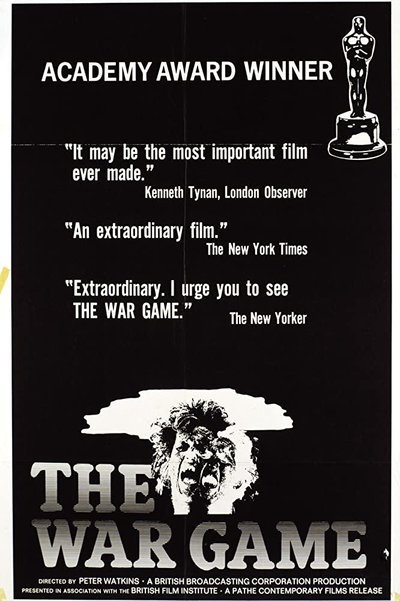Quote:
In the year 1999, totalitarianism prevails with the U.S.S.R. and U.S.A. colluding to govern the world by strict rules. Chaos erupts on the surface but state employees live safely underground. A radical and his son, visit his brother John’s family in the bunkers and the discourse grows hot.Read More »
Peter Watkins
-
Peter Watkins – Fällan AKA The Trap (1975)
Peter Watkins1971-1980PoliticsSci-FiSweden -
Peter Watkins – Culloden (1964)
Peter Watkins1961-1970ExperimentalUnited KingdomWarQuote:
The 1746 Battle of Culloden, the last land battle fought in the British Isles and the battle that ensured that Scotland was controlled by England. Not only do we see the battle unfold but also the lead-up, the key people involved and the aftermath.Read More » -
Peter Watkins – Edvard Munch [TV version] (1974)
Peter Watkins1971-1980DramaSwedenTVQuote:
The entire point of Peter Watkins’s cinematic career, so he seems to indicate in his interview with himself in the liner notes for New Yorker Video’s Edvard Munch DVD, is to directly challenge the perception deadening (at best) and enslaving (at worst) effects of the hegemony of 20th-century media, the conception of which was arguably the arrival of the moving picture. Strangely enough, two of his most acclaimed films take place decades before the Edison’s kinetoscope, but Watkins seems to use the anachronism of creating a hypothetical “first-person cinema” in the B.C. years to accentuate his impassioned appeal for elevated media consciousness. His recent six-hour millennial masterwork La Commune (Paris, 1871) was blunt about it, framing a rag-tag experimental theater ensemble attempting to reenact a moment of French social resistance with televised coverage from within (two community reporters practically serving as the film’s tour guides) and without (daily reports from the State-suckling network distorting the public’s all-but-assigned opinion).Read More » -
Peter Watkins – The War Game (1966)
1961-1970DramaPeter WatkinsUnited KingdomWarQuote:
Peter Watkins’ The War Game, which was filmed in handheld documentary fashion, speculates on the aftereffects of a nuclear war. Some of the images are almost impossible to look at; they truly illustrate the theory that, in the wake of such a holocaust, the living will envy the dead. The most heart-wrenching scene is the simplest. Asked what he wants to be when he grows up, a sullen young boy, physically unhurt but with obviously deep emotional scars, mutters “I don’t want to be nothin’.” Filmed for BBC television, The War Game was rejected by that august concern as being too graphic. The 47-minute film was released to theatres, making it eligible for the Best Documentary Academy Award, which it won in 1966Read More »
-
Peter Watkins – Privilege (1967)
1961-1970Peter WatkinsPoliticsSci-FiUnited Kingdom

Synopsis:
The story is set in the near future of the 1970s and concerns a disillusioned pop singer, played by Jones, who is manipulated by the church and state which seek to turn him into a messianic leader.Steven Shorter is the ultimate British music star. His music is listened to by everyone from pre-teens to grandparents. He has no trace of public bad habits or drug involvement. Everyone in Britain loves him. His handlers begin to use his popularity for projects like increasing the consumption of apples after a bumper crop as an aid to farmers.Read More »
-
Peter Watkins – Resan AKA The Journey (1987)
1981-1990DocumentaryHiroshima at 75Peter WatkinsPoliticsSweden
A global peace film produced in 1983-86 by the Swedish Peace & Arbitration Society and local support groups in Sweden, Canada, USA, Australia, New Zealand, USSR, Mexico, Japan, Scotland, Polynesia, Mozambique, Denmark, France, Norway, West Germany, with post-production support from the National Film Board in Montreal, Canada.Read More »
-
Peter Watkins – Fritänkaren aka The Freethinker (1994)
1991-2000Peter WatkinsPhilosophyPoliticsSweden
Quote:
“This is Peter Watkins (epic) companion-piece to his highly acclaimed “Edvard Munch” (1974). “The Freethinker” examines the life, art, and times of the noted Swedish dramatist August Strindberg, author of Miss Julie, Inferno, and Dance of Death. Strindberg is depicted as a rebel, and idealistic and controversial iconoclast who openly criticized the hypocrisy of 19th century society.” (p. back cover) The film broadly focuses on 3 aspects of Strindberg’s life- the impact of his childhood on his psychology and future work; the meaning of his relationship with his first wife, and the way in which Strindberg, as an author, created works that confronted the social injustices of their time.Read More » -
Peter Watkins – The Media Project (1991)
Documentary1991-2000AustraliaPeter WatkinsWar

About:
THE MEDIA PROJECT is an exposé on media coverage of the first Gulf War, directed by Peter Watkins. The film raises debate on the global media coverage of the Gulf War by taking examples from the Australian media coverage of the event and having them discussed by a small group of people from different backgrounds who are having dinner together. Written by Peter Watkins in conjunction with the cast, many of whom are expressing their own feelings and concerns.Read More » -
Peter Watkins – Punishment Park (1971)
1971-1980DramaPeter WatkinsPoliticsUSA
“A VIVIDLY EXECUTED PIECE OF PROVOCATION”
Quote:
A key film in the unimpeachable cry-in-the-wilderness corpus of Peter Watkins—a major filmography long marginalized and only now being prepped and released on any form of video— Punishment Park (1971) is an act of howling political righteousness, a dystopian critique intended for the peace-movement years but possibly even more relevant today. The premise is so simple it leaves singe marks: Watkins begins with the very real McCarran Act (just as he had based The War Game on Britain’s own nuclear-warfare cost analysis and contingency plans), which grants Ashcroftian summary-judgment powers to the president in times of potential “insurrection.” The Nixon-‘Nam years were those times, and so the film follows two groups of arrested protesters as they’re led to the Western desert, interrogated by a tribunal and then sent running, with national guardsmen and riot police following on the hunt.Read More »



